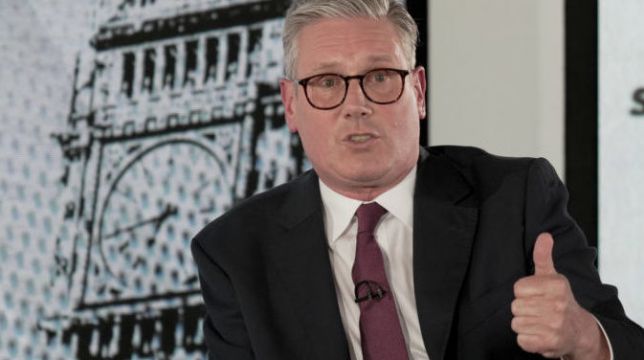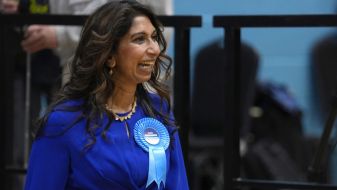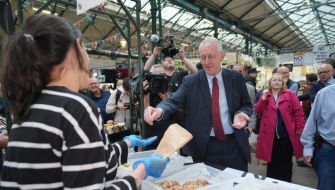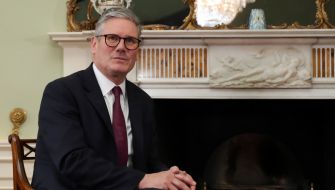The Labour Party looks set to win a landslide victory in the UK General election. Conservative Party leader Rishi Sunak conceded defeat and congratulated Labour leader Keir Starmer.
Highlights of the results so far are:
- UK cabinet ministers to lose their seats so far are Grant Shapps, the Defence Secretary; and Alex Chalk, the Justice Secretary. Commons leader Penny Mordaunt has been beaten by Labour. Others big-name losses are expected.
- The Alliance Party’s Sorcha Eastwood has defeated the DUP in Lagan Valley, the seat formerly held by ex-DUP leader Sir Jeffrey Donaldson.
- Nigel Farage has won the seat of Clacton, on his eighth attempt to become an MP.
- Jeremy Corbyn has won his seat of Islington North as an independent.
- George Galloway has lost his Rochdale seat to Labour.
An Exit poll for the UK General Election suggests Labour is on course for 410 seats, with the Conservatives reduced to 131.
Liberal Democrats will secure 61, while the Reform Party will get 13, the SNP falls back to 10, Plaid Cymru in Wales secures four seats in the UK parliament. Others, including the North's parties secure 38, according to the Exit Poll conducted by Ipsos UK for Sky News, BBC and ITV News said.
If the Exit Poll were completely accurate, it would see Labour gain 209 seats, the Conservatives lose 241, and Liberal Democrats gaining 53.
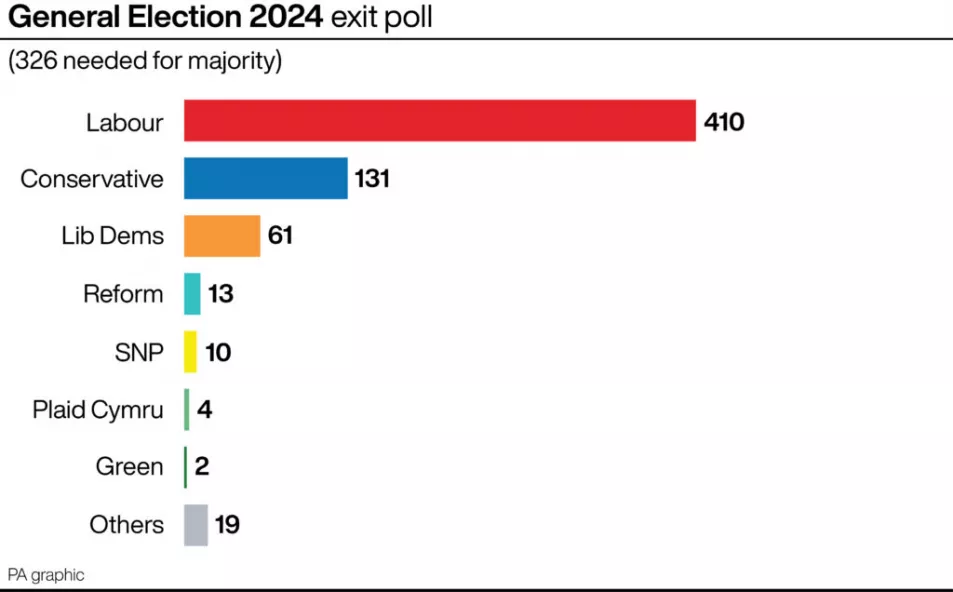
While such a result would be devastating for the Conservative party, it would still be better than some of the recent polling predictions that suggested the Tories could be the third-largest party in the UK parliament – with the Liberal Democrats taking second place.
The result will mean a Labour prime minister in No 10 for the first time in 2010 and the Conservatives facing a possible civil war as the fight for the future direction of the party and the battle to potentially replace Mr Sunak gets under way.
Labour’s national campaign chief Pat McFadden said: “Keir Starmer’s transformation of the Labour Party has been remarkable.
“He has put country before party and has transformed Labour from a party focused on itself to one back in the service of the British public. We have campaigned as a changed Labour Party, ready to change Britain.”
But despite the exit poll indicating a landslide win, he added: “It’s going to be a long night, and it will be several hours until we know the full picture of results.
“Labour will need a swing bigger than Tony Blair achieved in 1997 to achieve a majority of just one seat.”
To everyone who has campaigned for Labour in this election, to everyone who voted for us and put their trust in our changed Labour Party – thank you. https://t.co/q6yDNPnAbo
Advertisement— Keir Starmer (@Keir_Starmer) July 4, 2024
Shortly before polls closed, UK Prime Minister Rishi Sunak said: “To the hundreds of Conservative candidates, thousands of volunteers and millions of voters: Thank you for your hard work, thank you for your support, and thank you for your vote.”
Mr Sunak is expected to resign after leading his party to defeat, but many of the contenders jostling to replace him are nervously awaiting their own constituency results to see if their leadership dreams survive the night.
The likes of Penny Mordaunt, Suella Braverman, Steve Baker and Robert Jenrick all face battles to return to Parliament.
Britain's Defence Secretary Grant Shapps lost his seat to Labour.
Former home secretaries Suella Braverman and Dame Priti Patel, security minister Tom Tugendhat and Health Secretary Victoria Atkins could survive to fight for the leadership.
With 205 constituency results declared, Labour has won 155 seats with a 39% share of the vote.
The Conservatives have 27 seats and a 21.7% vote share.
The Liberal Democrats have won in 15 constituencies with 9.5% of the overall vote, while Reform UK have 16.4% of the vote, translating to success in two seats.
The SNP has two seats and Plaid Cymru is on one.
The Green Party has 6.5% of the votes.
A total of 136 candidates are standing in the North’s 18 constituencies. It is worth noting the Ipsos Exit Poll did not take place in Northern Ireland.
Counting is taking place in three count centres – the Titanic Exhibition Centre in Belfast, the Meadowbank Sports Arena in Magherafelt and the South Lake Leisure Centre in Craigavon.
While there have been no official figures released on voter turnout in the region so far, several polling stations reported brisk business.
Northern Ireland’s political leaders cast their votes earlier on Thursday.
Sinn Féin vice president Michelle O’Neill voted in Coalisland in Co Tyrone, DUP leader Gavin Robinson and Alliance Party leader Naomi Long both cast ballots in their home constituency of east Belfast while UUP leader Doug Beattie and SDLP leader Colum Eastwood voted in Portadown and Derry respectively.
All eyes will be on the race for the greatest number of seats, with the potential of Sinn Féin cementing its position as the largest party in Northern Ireland, having come out on top in the last Assembly and local council polls.
Sinn Féin, which ran a relatively low-key campaign, could secure first place by retaining the seven seats it already holds, if the DUP drops down from the eight seats it won in 2019.
The two main parties traded relatively few hard blows during the last six weeks, reflective of the fact that relations between them have been fairly good in the five months since they resumed joint leadership of Stormont’s restored devolved coalition government.
While most of Sinn Féin’s seats are safe bets, it will face the usual arm wrestle to hold off the challenge of unionists in the ever-close Fermanagh and South Tyrone race.
In that constituency, former Royal College of Nursing general secretary Pat Cullen, who led nurses across the UK in strike action last year, is up against Ulster Unionist councillor Diana Armstrong.
Armstrong said she is “very confident” she can reclaim the seat from Sinn Féin.
“I’m very confident in winning the seat. I’ve conducted a really good campaign with a really good team,” she said as she arrived at Magherafelt count centre.
“We’ve covered the entire constituency, visited every village and every town so yes, I’m confident the hard work has paid off.
“It’s something that’s been building and certainly the confidence of the Ulster Unionist Party and the messaging that we’re giving.
“Certainly I just feel it has been something that we’ve been waiting for to happen.
“I would remain cautious. We obviously have to go through a process here and I’m feeling confident because I have faith in my campaign and my team.
“I know the people, I know the area. I’m a hard-working councillor and I do know what matters in Fermanagh.
“I feel I’m in touch with people. I’m grounded and I belong to the place. So I think those are advantages that I’ve proven myself well over the years.”

Sinn Féin vice president O’Neill voted at St Patrick’s Primary School in Coalisland, Co Tyrone.
She briefly spoke with a Sinn Féin member in a makeshift mobile outside the polling station and then spent several minutes inside as she cast her vote.
Asked by photographers for a thumbs-up, she laughed and said: “Will a smile do?”
As she left the polling station, she shouted goodbye to local children and waved to voters.
The DUP is under pressure in a number of constituencies, most significantly in East Belfast where Mr Robinson is involved in a high-stakes contest with Alliance Party leader Ms Long.
Mr Robinson’s elevation to the leadership of his party came after the DUP suffered a seismic shock when former leader Sir Jeffrey Donaldson quit after he was charged with a range of historical sexual offences in March – charges he denies.
Apart from the sudden departure of Donaldson from the political stage, the DUP has also been under fire from unionist rivals amid claims it oversold a Government package of measures on post-Brexit trading arrangements that the party used to justify the end of its two-year boycott on devolution at Stormont in January.
Defeat for Mr Robinson would be likely to raise questions about his fledgling leadership of the DUP, while a loss for Ms Long would prompt some to ask whether the Alliance Party’s surge of recent years has begun to subside.
Mr Robinson greeted waiting media as he arrived at the Elim church polling station on Thursday morning.
“Fresh and well you’re looking,” he said.
Leaving the polling station, the DUP leader said it was good to have voted before giving a thumbs-up to photographers.
The Alliance Party is walking a tightrope between having a really good night or a very disappointing one.
It is involved in three razor-edge fights where it is in serious contention for seats.
The party goes into the election with one seat, deputy leader Stephen Farry’s in North Down.
Mr Farry has been involved in a tough battle to hold that seat while his party is also hoping that Ms Long prevails in East Belfast and Sorcha Eastwood defeats the DUP in Lagan Valley, in the seat vacated by long-standing MP Donaldson.
While three victories could be secured, three losses would sting heavily for a party that has been on the electoral march in recent years.
Alliance leader Ms Long brought her dog Daisy to the polling station at St Colmcille’s parochial hall in east Belfast.
Asked if she felt confident, Ms Long told reporters: “I’m feeling relaxed, we’ll see. Confidence is never a good thing, I’m just relaxed.”
Along with her husband Michael, they had to shelter for several minutes inside the polling station before leaving due to the intensity of a sudden downpour outside.
The Ulster Unionists were without an MP in the last parliament and the party is convinced that South Antrim represents its best opportunity of a return to the green benches at Westminster.
Former UUP leader Robin Swann, whose profile soared when he led Northern Ireland’s fight against the Covid pandemic as Stormont health minister, is trying to win that seat from the DUP’s Paul Girvan.
UUP leader Mr Beattie voted at Seagoe Primary School in Portadown.
He greeted waiting media and posed for photographs as he arrived at the polling station.
“It is an important day, it is a day for the people to cast their votes,” he said.
“We have run a good campaign.”
Success for the SDLP would be the retention of the two seats held in the last parliament by its leader, Mr Eastwood, and deputy leader, Claire Hanna.
Both are tipped for victory – in Foyle and South Belfast and Mid Down respectively – albeit with the prospect of returning with reduced majorities.
Mr Eastwood did not speak to the media after voting at the Model Primary School in Derry but posed for selfies with supporters and exchanged a hug with party MLA Mark Durkan.
The TUV, which is an arch critic of the DUP’s decision to drop its protest boycott on devolution, did not stand in the last election.
While its entry into the fray this time round is highly unlikely to deliver it any seats, the votes it could potentially take from DUP candidates could have major implications in some of the closest battleground seats.
However, the TUV campaign suffered a major blow last month when Reform UK leader Nigel Farage personally endorsed two DUP election candidates, despite his party having an official electoral alliance with the TUV in Northern Ireland.
That has led to a highly unusual situation in TUV leader Jim Allister’s own North Antrim constituency, where he is running on a joint TUV-Reform UK platform, even though Mr Farage has personally backed the DUP candidate in that area, Ian Paisley. - PA
